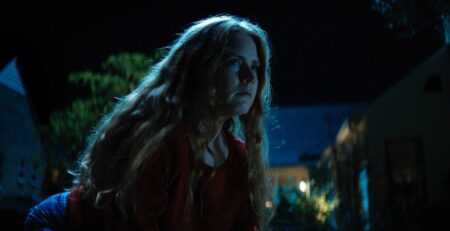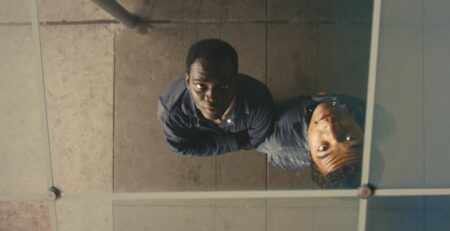
Guilt eats at you. Once it takes hold, especially when steeped in trauma, it crawls into your skin and impacts your every move. Guilt survives on fear and traps us in a moment that we relive constantly. To escape it, we push away the elements of ourselves associate with, trying to push away the trauma. This is the crux of The Vigil, a film from IFC Midnight, written and directed by Keith Thomas.
The Vigil is steeped in Jewish lore and demonology. Taking course over a single evening in Brooklyn’s Hasidic Borough Park neighborhood, the film presents audiences with a horror baked in trauma and a story propelled by guilt. In the film, Yakov (Dave Davis) is low on funds. Having recently left his insular religious community, he reluctantly accepts an offer from his former rabbi and confidante (Menashe Lustig) to take on the responsibility of an overnight “shomer,” fulfilling the Jewish practice of watching over the body of a deceased community member in the days before burial.
When Yakov takes the job, he is to protect the body of Mr. Litvak, a Holocaust survivor. Shortly after arriving at the recently departed’s dilapidated house to sit the vigil, Yakov begins to realize that something is very, very wrong. Unbeknownst to Yakov, a Mazzik has been latched on to Mr. Latvik for decades, and his job of sitting vigil isn’t as simple as it seems. Living from his guilt and trauma, and now it’s set its sights on Yakov, who is still working through his own past trauma. Without getting into spoilers about both men’s lives, the Mazzik works as a way to both instill fear in the viewer but also to work as a monster that pushes our main character to confront his past and move past it.
The Mazzik doesn’t only take a physical toll on Yakov’s body, it speaks to him through those he trusts and loves, using technology to its advantage. As Yakov reaches for others, friends, and his therapist, the Mazzik intervenes at every turn, forcing Yakov to face his past and make the choice if he will keep looking back or destroy it. The Mazzik, represented in its victims with a head turned backward is a powerful metaphor for the way our trauma keeps us stuck looking at the past and how we can choose to fight and finally start looking forward.

The Vigil is an intimate story. Shot primarily in a single house and on a single night, the story’s success falls on Davis’s shoulders as our lead. As Yakov, Davis is terrifyingly relatable, extremely emotive, and capable of pulling empathy from the audience. For long periods of time, Davis is the only actor on screen. Davis’s phenomenal acting is ultimately my favorite part of the film.
That said, my only issue with The Vigil is how visually dark the film is. While I have a deep appreciation for the use of greens and shadow in the film, the claustrophobic atmosphere could have been maintained without making the audience squint to see what is happening. But this is a small complaint for a strong film. The darkness lends to small jump scares but for the large atmospheric dread that the film wraps you in isn’t due to the lighting, it’s the sound design. While the film’s closing song feels like closure, it’s the small sounds through the film that unsettle the viewer. Small creaks, the sound of bones, and ultimately the sounds of the body, transform from innocuous to terrifying. And that alone makes up for small imperfections in lighting.
The Vigil may not seem like a revolutionary film, and in some ways, it isn’t. We’ve seen stories of demons haunting people instead of places before. We’ve seen films take place in cramped quarters over a short period of time. But what we haven’t seen, is a horror film aimed to not just use Jewish culture as set dressing (like 2012’s The Possession) but instead uses Jewish culture and history to tell its story. The film itself features a mixture of English, Yiddish, and Hebrew. The supernatural force that clung to Mr. Litvak and now tries to do so with Yakov is a personal interpretation of a demon from Jewish lore. And finally, the trauma on display in the film is specific to the Jewish experience, specifically antisemitism.
This is a film that showcases the importance of horror expanding past the same narratives and embracing cultural nuances, practices, and beliefs to tell new stories. Additionally, The Vigil represents a universal story of confronting the painful mixture of grief, trauma, and guilt. Fighting the fear that it instills in us and coming out of a long night of darkness and pain to see the sun. While the heart of the film can be appreciated by all, it also manages to showcase a story that looks deeply at not just personal trauma, but intergenerational trauma within the Jewish community. More specifically, how the pain from the Holocaust has remained within the community, from survivors to the antisemitism that the current generation faces.
As a whole, The Vigil is a must-see horror film for fans of the supernatural. But more importantly, it’s a film that tackles a universal story through a cultural lens and does so by centering Jewish identity and belief. Ultimately, The Vigil is a great start to 2021’s horror offerings and I hope to see more horror stories from this cultural perspective and from the filmmaker as well.
The Vigil is available on digital platforms and VOD on February 26, 2021.
The Vigil
-
Rating - 9/109/10
TL;DR
As a whole, The Vigil is a must-see horror film for fans of the supernatural. But more importantly, it’s a film that tackles a universal story through a cultural lens and does so by centering Jewish identity and belief. Ultimately, The Vigil is a great start to 2021’s horror offerings and I hope to see more horror stories from this cultural perspective and from the filmmaker as well.




